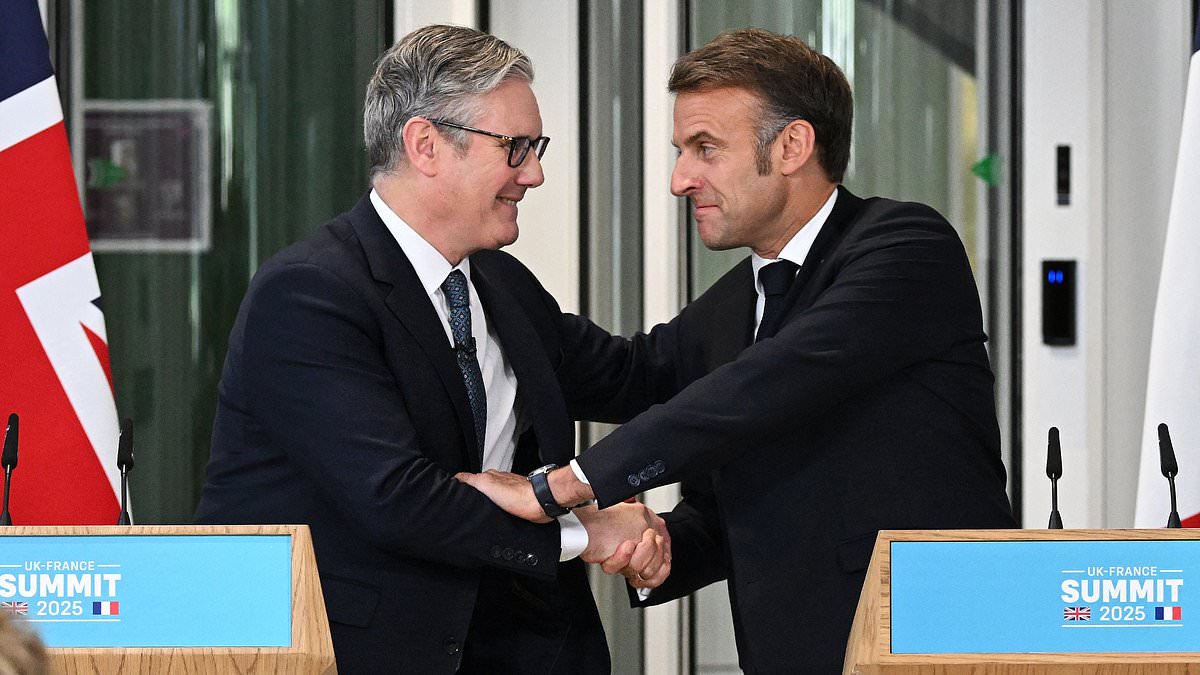Keir Starmer had hoped his first major international move as Prime Minister would signal a turning point in the ongoing migrant crisis across the English Channel.
But just hours after unveiling his much-anticipated migrant return deal with French President Emmanuel Macron, critics on all sides were already picking it apart.
What was meant to be a “ground-breaking” solution is now being labelled by many as vague, weak, and potentially unworkable.
What’s in the Deal? A “One In, One Out” Swap System
At the heart of the new arrangement is a pilot “one in, one out” policy.
The idea is simple: for every migrant the UK sends back to France—specifically, those who crossed illegally by small boat—Britain will accept another migrant through a safe, legal, and vetted route.
Starmer says this proves the principle that small boat crossings won’t pay off anymore.
But he was quick to admit it’s not a “silver bullet.”
While Starmer insists the deal is a hard-nosed approach to a growing crisis, others are questioning its actual teeth.
For now, the number of people to be returned is still unclear, and no exact start date was offered—just a vague “in the coming weeks.”
The Fine Print: Legal Roadblocks and Missing Details
The deal might sound neat in theory, but the practicalities are a different story.
For one, the agreement hasn’t been signed off by the European Commission, which could delay or even block the move if it violates EU rules.
And there are big concerns around enforcement: migrants returned to France won’t be detained, meaning they could easily attempt to re-enter the UK, possibly reverting to old tactics like hiding in lorries.
Even more concerning is the absence of any firm update on allowing French police to intercept boats in the Channel itself—something many hoped would be part of the deal.
In short, a lot of key details are still missing.
Numbers Paint a Grim Picture
Since Labour came into power, over 44,000 migrants have arrived in the UK via small boats.
This year alone has already seen more than 21,000 arrivals, a 50% spike compared to last year.
And on the very day Starmer and Macron presented their plan to the world, an estimated 400 more migrants landed on British shores.
The figures raise an uncomfortable question: can this deal really make a dent in such large-scale movement?
Opposition Erupts: “A National Joke”
The response from opposition politicians has been swift and scathing.
Reform UK leader Nigel Farage blasted the entire proposal, calling it “farcical” and demanding a national emergency be declared.
He even proposed interning migrants in old army camps to stem the tide.
Tory MP Chris Philp also weighed in, saying Labour’s decision to scrap the previous government’s Rwanda policy and loosen migration checks has made Britain a magnet for illegal immigration.
“This is a green light to people smugglers,” he said.
Kent MP Katie Lam didn’t hold back either. “Swapping one dinghy arrival for 17 applicants from Paris won’t deter a single person,” she scoffed.
“Until Labour embraces detention and deportation, Britain will stay an easy target.”
Macron’s Take: Cooperative, But Blames Brexit
During their press conference, Macron praised the spirit of cooperation behind the agreement, but he didn’t hold back from pointing fingers.
He said the ongoing crisis is partly due to Brexit, blaming it for removing the UK from frameworks that once helped manage immigration more effectively.
“Many in Britain believed Brexit would help stop illegal migration,” Macron said. “That simply hasn’t happened.”
He also stressed that the deal still needs legal approval—not just from France, but also from countries like Spain and Greece, which may need to accept back migrants who originally passed through their borders.
Migrant Voices Missing, But Farage Makes His Own Spectacle
Adding fuel to the fire, Nigel Farage took a boat trip out to witness one of the Channel crossings firsthand.
He watched as 78 migrants were picked up and brought aboard a Border Force vessel, claiming without evidence that some may be criminals or terrorists.
He warned they’d likely be housed at the public’s expense and working in the gig economy “within 48 hours.”
His language was provocative, and his tone alarmist, but his words are likely to resonate with voters who feel the crisis is out of control.
An Unlikely Concession from France
Despite all the backlash, the very fact that France agreed to any form of return deal is notable.
For years, the French government refused to entertain such an idea while the Conservatives were in power.
Starmer may see this as a diplomatic win, even if the victory feels hollow for now.
Experts Say Scale Is Key
Sunder Katwala, director of the migration think-tank British Future, says the scheme could make a real difference—if it’s scaled up.
“At ten times the current size, this deal could genuinely reduce small-boat crossings and undercut smuggling operations,” he said.
But scaling up won’t be easy. The legal, political, and logistical hurdles remain massive.
So What Happens Next?
For now, the deal is still more promise than policy.
It needs sign-off from Brussels, legal frameworks must be nailed down, and many of the practical elements—like detention, processing, and fast returns—are still murky.
Starmer’s government faces a tough path ahead.
The pressure is on to prove that this deal isn’t just a headline-grabber but a real step toward fixing what’s become a defining crisis for both Britain and France.
